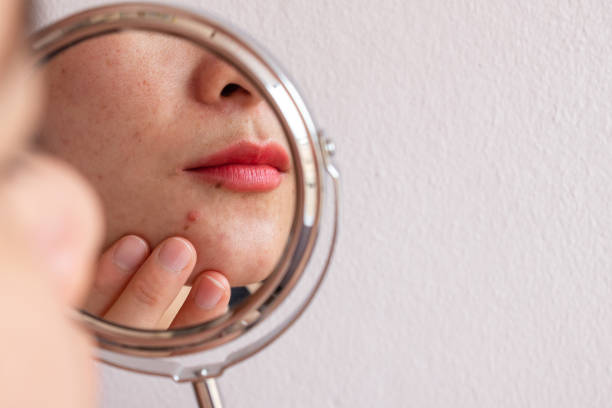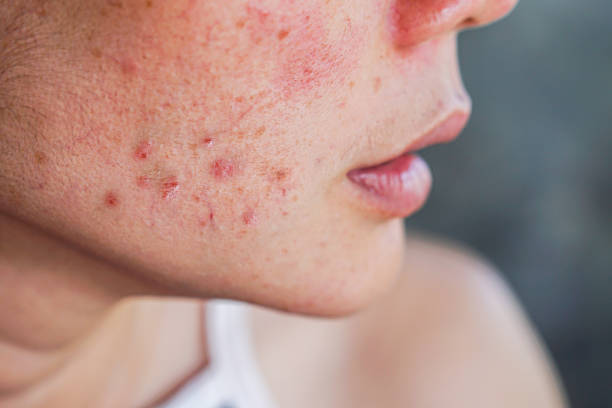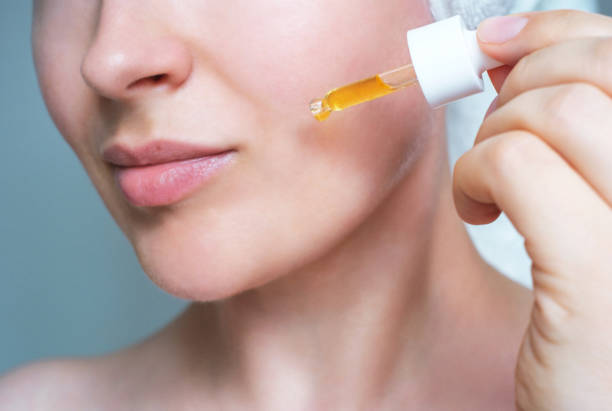Dealing with acne can be a daunting challenge, and for many, the real struggle comes after the breakouts have cleared – the lingering scars and marks left behind. These remnants of acne can be frustrating, but not all of them are the same.
In this article, we’ll delve into the differences between acne scars and marks, why they should be treated differently, and how skincare can play a role in their management.
Distinguishing Between Acne Scars and Marks

Image from iStock
Before we dive into the world of skincare, it’s essential to understand the distinction between acne scars and marks. Often, people use the term “acne scar” to describe any post-acne skin imperfection, but this is a misconception. There are primarily two types of residual marks left on the skin after acne:
Acne Marks or Post-Inflammatory Hyperpigmentation
These appear as flat spots of discoloration on the skin. They are not true scars and tend to fade away with time and proper care.
Acne Scars
These are more serious skin conditions that disrupt the surface of the skin, appearing either as indented pits or raised marks. Acne scars are permanent and result from irregularities in the skin-healing process during acne formation.
Understanding this difference is crucial because the treatment approach varies significantly between the two.
Can Skincare Diminish Acne Marks and Scars?
Let’s get straight to the point: when it comes to acne scars, the answer is no. Acne scars are permanent, and even advanced treatments like lasers may not completely remove them, although they can improve their appearance. The realm of acne scars is diverse, with various types responding differently to treatment. Consulting a dermatologist is the best course of action for addressing acne scar issues.

Image from iStock
On the other hand, acne marks can fade over time with proper care. Dermatologists often employ topical medications to treat these marks, sometimes incorporating cosmeceuticals. It’s important to note that cosmeceuticals are not as potent as topical medicines but can still contribute to fading marks effectively.
Ingredients That Target Marks
If you’re looking to incorporate over-the-counter skincare products into your routine to lighten acne marks, keep an eye out for these key ingredients:
Azelaic Acid
This ingredient reduces the effects of tyrosinase, an enzyme responsible for hyperpigmentation. It also promotes skin cell turnover and alleviates inflammation, making it beneficial for those dealing with active acne.
Vitamin C

Image from iStock
While not as effective as azelaic acid for tackling acne marks, vitamin C offers skin-brightening and antioxidant effects, suitable for various skin types.
Retinol
Known for boosting cell turnover, retinol can help diminish acne marks. However, individuals with sensitive skin should use it with caution.
Chemical Exfoliants
Ingredients like lactic acid or salicylic acid can gently exfoliate the skin, aiding in the lightening of superficial marks. Be mindful not to overdo exfoliation, especially if you have active acne or sensitive skin.
Other Skincare Considerations
Incorporating these products into your skincare routine should be part of a comprehensive approach. Maintain a regular skincare regimen, which includes gentle yet thorough cleansing and proper hydration with a suitable moisturizer. An anti-inflammatory spot treatment can be helpful for ongoing or future breakouts.
When it comes to makeup, you don’t need to avoid it entirely. Look for non-comedogenic makeup formulated to prevent pore-clogging, making it ideal for acne-prone skin. Mineral makeup, in particular, is hypoallergenic and a safe choice for those with acne concerns.
Takeaway
In a nutshell, understanding the difference between acne scars and marks is crucial for effective treatment. While skincare can help with acne marks, it’s essential to consult a dermatologist for personalized guidance on dealing with acne scars. With the right approach, you can achieve clearer, healthier-looking skin.
ALSO READ
Best Pregnancy-Safe Acne Patch Brands You Can Use to Heal Pimples Overnight
Postpartum Acne: Why Do I Have It and How Can I Treat It?
Bye Bye Blemish: The Best Facial Wash Products for Pregnancy Acne
 Together Against RSV
Together Against RSV SG60
SG60 Pregnancy
Pregnancy Parenting
Parenting Child
Child Feeding & Nutrition
Feeding & Nutrition Education
Education Lifestyle
Lifestyle Events
Events Holiday Hub
Holiday Hub Aptamil
Aptamil TAP Recommends
TAP Recommends Shopping
Shopping Press Releases
Press Releases Project Sidekicks
Project Sidekicks Community
Community Advertise With Us
Advertise With Us Contact Us
Contact Us VIP
VIP Rewards
Rewards VIP Parents
VIP Parents
